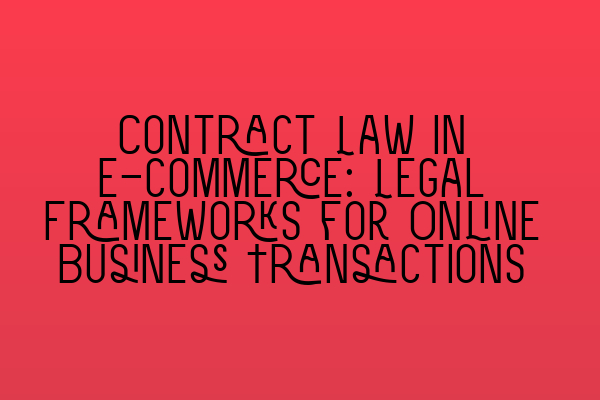Contract Law in E-commerce: Legal Frameworks for Online Business Transactions
In today’s digital age, e-commerce has become a vital part of the business landscape. With the increasing popularity of online shopping, it is crucial for businesses to understand and navigate the legal frameworks surrounding contract law in the realm of e-commerce.
When engaging in online transactions, it is essential to establish a clear and enforceable contract between the buyer and seller. This contract serves as the foundation for the rights and obligations of both parties and ensures a smooth and fair business transaction. Understanding the legal frameworks that exist in e-commerce can help businesses protect their interests and avoid potential disputes down the line.
One of the key laws that govern e-commerce transactions is the Electronic Commerce (EC Directive) Regulations 2002. These regulations provide legal recognition for electronic contracts and establish the rules for their validity and enforceability. According to these regulations, electronic contracts must meet certain requirements to be considered legally binding, such as the clear indication of the offer, acceptance, and consideration.
To ensure compliance with the Electronic Commerce Regulations, businesses must pay careful attention to the elements of an online contract. This includes clearly stating the terms and conditions of the transaction, the price of the goods or services, and any additional charges or fees. It is also crucial to provide customers with an opportunity to review and confirm their acceptance of these terms before completing the transaction.
Another important legal framework in e-commerce contract law is the Consumer Rights Act 2015. This legislation establishes the rights and protections afforded to consumers when engaging in online transactions. It ensures that consumers have the right to clear and accurate information about the goods or services they are purchasing. It also protects them against unfair contract terms and provides remedies in the event of breach of contract or faulty goods.
Businesses must be aware of their obligations under the Consumer Rights Act and ensure that their online contracts align with these requirements. This includes being transparent about the product descriptions, delivery timelines, and cancellation rights. By adhering to these regulations, businesses can build trust with their customers and minimize the risk of legal disputes.
In addition to national laws, businesses also need to consider the impact of international regulations on their e-commerce contracts. The European Union’s General Data Protection Regulation (GDPR) is a prime example of an international legal framework that affects online business transactions. The GDPR regulates the processing and protection of personal data and imposes obligations on businesses that collect and process such data. This includes obtaining informed consent from customers and implementing appropriate data security measures.
By ensuring compliance with the GDPR, businesses can build trust with their customers and demonstrate their commitment to protecting personal information. This not only helps to safeguard customer data but also mitigates the risk of costly legal actions and reputational damage.
Navigating the legal challenges and pitfalls in e-commerce contract law can be complex. It is advisable for businesses to seek legal advice and guidance to ensure compliance with the relevant regulations and to protect their interests. Consulting with a solicitor who specializes in contract law can help businesses understand their rights and obligations, draft enforceable online contracts, and navigate any legal disputes that may arise.
If you’re interested in learning more about the legal challenges and pitfalls in your legal practice, be sure to check out our related article: Navigating Legal Challenges and Pitfalls in Your Practice.
For a comprehensive comparison between barristers and solicitors, you may find our article on Barrister vs. Solicitor: A Comprehensive Comparison useful in understanding the different roles and responsibilities between the two legal professions.
If you’re interested in exploring different solicitor specializations and finding your niche, our article on Exploring Different Solicitor Specializations: Finding Your Niche can provide valuable insights into various areas of legal practice.
As the legal profession evolves, embracing the rise of virtual law practices is becoming increasingly important. To learn more about virtual law practices and their benefits, check out our related article: Embracing the Rise of Virtual Law Practices.
Finally, if you want to demystify the ethical responsibilities of solicitors and ensure you navigate the maze of legal ethics confidently, our article on Navigating the Maze: Demystifying Ethical Responsibilities of Solicitors offers a comprehensive guide on understanding and upholding ethical standards in the legal profession.
In conclusion, contract law in e-commerce plays a crucial role in establishing clear and enforceable agreements between buyers and sellers. By understanding the legal frameworks surrounding online transactions and seeking legal advice when needed, businesses can protect their interests, build trust with customers, and thrive in the digital marketplace.
Remember, it is always important to consult with a solicitor who specializes in contract law to ensure compliance with the relevant regulations and to safeguard your business interests.
